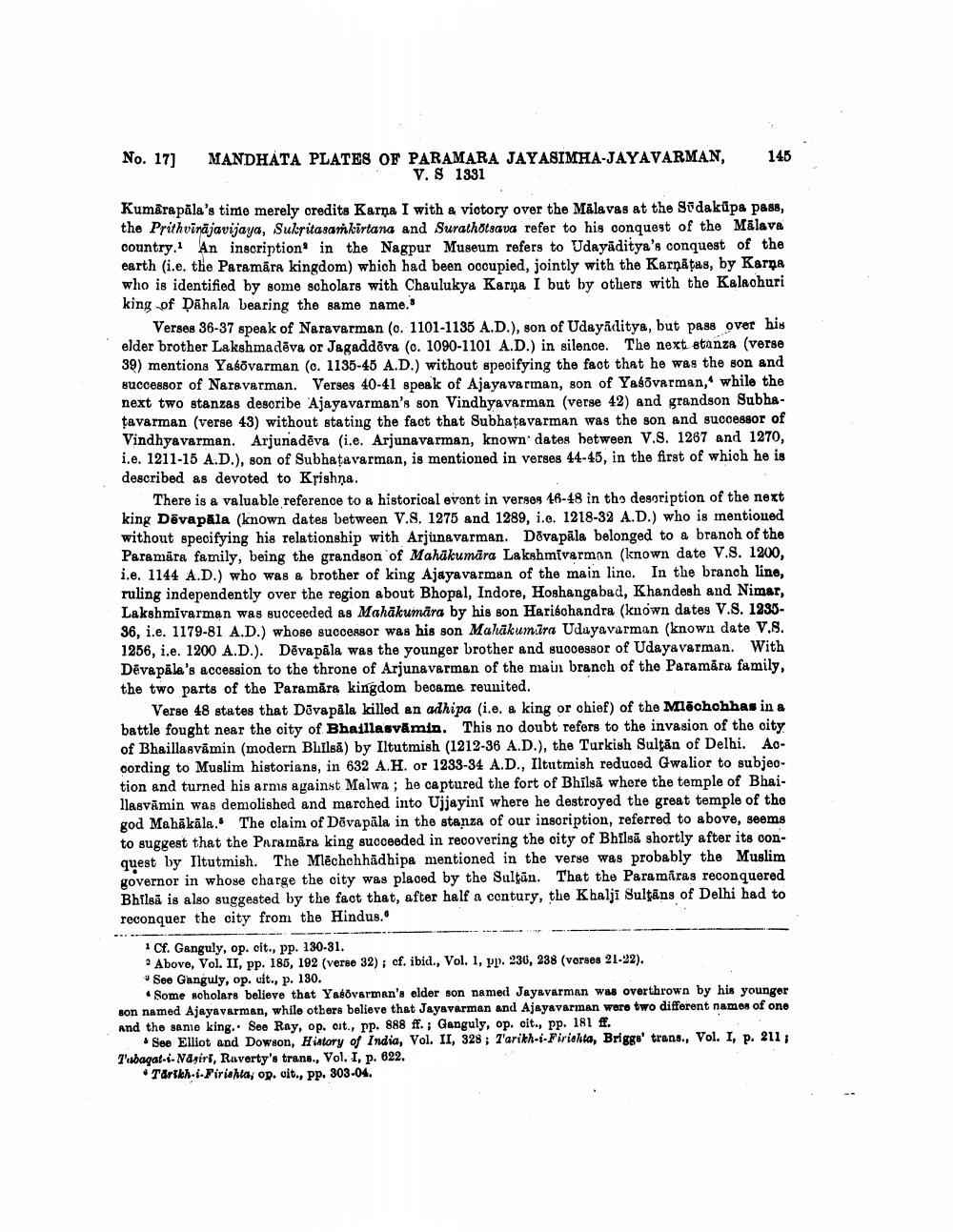________________
No. 17]
MANDHATA PLATES OF PARAMARA JAYASIMHA-JAYAVARMAN, V. S 1331
145
Kumarapala's time merely credits Karna I with a victory over the Malavas at the Sudakupa pass, the Prithvirajavijaya, Sukritasamkirtana and Surathotsava refer to his conquest of the Malava country. An inscription in the Nagpur Museum refers to Udayaditya's conquest of the earth (i.e. the Paramāra kingdom) which had been occupied, jointly with the Karnatas, by Karna who is identified by some scholars with Chaulukya Karna I but by others with the Kalachuri king of Dahala bearing the same name."
Verses 36-37 speak of Naravarman (c. 1101-1135 A.D.), son of Udayaditya, but pass over his elder brother Lakshmadeva or Jagaddova (c. 1090-1101 A.D.) in silence. The next stanza (verse 39) mentions Yasövarman (c. 1135-45 A.D.) without specifying the fact that he was the son and successor of Naravarman. Verses 40-41 speak of Ajayavarman, son of Yasovarman, while the next two stanzas describe Ajayavarman's son Vindhyavarman (verse 42) and grandson Subhatavarman (verse 43) without stating the fact that Subhaṭavarman was the son and successor of Vindhyavarman. Arjunadeva (i.e. Arjunavarman, known' dates between V.S. 1267 and 1270, i.e. 1211-15 A.D.), son of Subhatavarman, is mentioned in verses 44-45, in the first of which he is described as devoted to Krishna.
There is a valuable reference to a historical event in verses 46-48 in the description of the next king Devapāla (known dates between V.S. 1275 and 1289, i.e. 1218-32 A.D.) who is mentioned without specifying his relationship with Arjunavarman. Dovapala belonged to a branch of the Paramara family, being the grandson of Mahākumāra Lakshmivarman (known date V.S. 1200, i.e. 1144 A.D.) who was a brother of king Ajayavarman of the main line. In the branch line, ruling independently over the region about Bhopal, Indore, Hoshangabad, Khandesh and Nimar, Lakshmivarman was succeeded as Mahākumāra by his son Harischandra (known dates V.S. 123536, i.e. 1179-81 A.D.) whose successor was his son Mahākumāra Udayavarman (known date V.S. 1256, i.e. 1200 A.D.). Devapala was the younger brother and successor of Udayavarman. With Devapala's accession to the throne of Arjunavarman of the main branch of the Paramara family, the two parts of the Paramara kingdom became reunited.
Verse 48 states that Dövapäla killed an adhipa (i.e. a king or chief) of the Mlechchhas in a battle fought near the city of Bhaillasvämin. This no doubt refers to the invasion of the city of Bhaillasvamin (modern Bhilsa) by Iltutmish (1212-36 A.D.), the Turkish Sultan of Delhi. According to Muslim historians, in 632 A.H. or 1233-34 A.D., Iltutmish reduced Gwalior to subjeotion and turned his arms against Malwa; he captured the fort of Bhilsa where the temple of Bhaillasvamin was demolished and marched into Ujjayini where he destroyed the great temple of the god Mahākāla. The claim of Devapala in the stanza of our inscription, referred to above, seems to suggest that the Paramāra king succeeded in recovering the city of Bhilsa shortly after its conquest by Iltutmish. The Mlechchhadhipa mentioned in the verse was probably the Muslim governor in whose charge the city was placed by the Sultan. That the Paramaras reconquered Bhilsa is also suggested by the fact that, after half a century, the Khalji Sultans of Delhi had to reconquer the city from the Hindus.
1 Cf. Ganguly, op. cit., pp. 130-31.
2 Above, Vol. II, pp. 185, 192 (verse 32); cf. ibid., Vol. 1, pp. 236, 238 (verses 21-22).
*See Ganguly, op. cit., P. 130.
Some scholars believe that Yasovarman's elder son named Jayavarman was overthrown by his younger son named Ajayavarman, while others believe that Jayavarman and Ajayavarman were two different names of one and the same king. See Ray, op. cit., pp. 888 ff.; Ganguly, op. cit., pp. 181 ff.
See Elliot and Dowson, History of India, Vol. II, 328; T'arikh-i-Firishta, Briggs' trans., Vol. I, p. 211; Tabagat-i-Nasiri, Raverty's trans., Vol. I, p. 622.
Tarikh-i-Firishta, op. cit., pp. 303-04.




